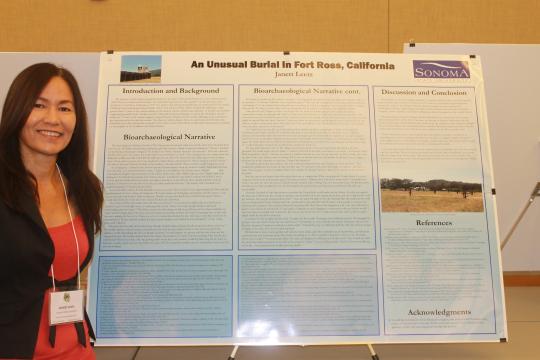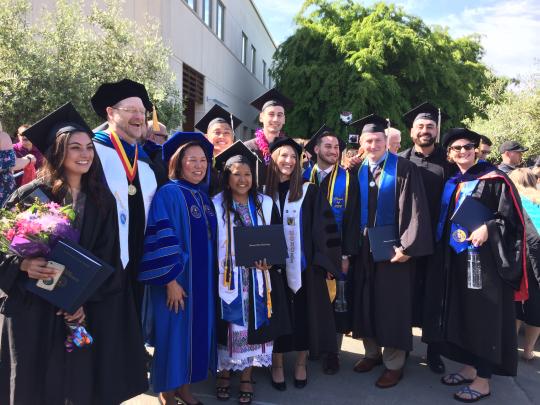Of all the social sciences, anthropology is the broadest. Anthropology as a discipline studies the foundations and forms of human social and cultural diversity, past and present, via biology, behavior, language, and material culture. Anthropology as a practice applies this knowledge to the solution of human challenges. Anthropologists study how human beings have come to be as they are: a physically distinct species, communicating through language, adapted to every habitat on earth, and living in an amazing variety of lifeways. Anthropologists have led in developing a global and local perspectives on how culturally different peoples interact in contexts of power and inequality, and how humans continuously transform their ways of life in response to environmental and social change.
The anthropology major at Sonoma State University teaches students about many different cultures throughout the world, how they developed, the significance of their differences, and how they change over time. Students develop a set of skills for applying broad, integrative perspectives to themselves and others. Through training in anthropology, students also acquire the ability to formulate theoretical and practical questions regarding human life, collect and organize data on many levels of human biology and behavior, and construct appropriate interpretations and generalizations based on well thought-out procedures. The combination of knowledge about human ways of life and training in analytical skills are crucial to any field dealing with human society and culture. This perspective is invaluable in preparing students for careers in research professions or in a wide range of professional fields, including cultural resources management, environmental planning, teaching, public health administration, business, public relations, law, community development, and international service.
Subfields of Anthropology
Archaeology
Archaeology examines the ways of life of past humans, from recent history to the earliest members of our species. Its practitioners study objects made or modified by humans, organic remains (human, animal, and plant), written records, and oral traditions to understand the experiences of past peoples and the societies and natural environments in which they lived.
Linguistic Anthropology
Linguistic Anthropology understands language and communication systems as the keys to society and culture. By examining the structure and diversity of language in all its forms (past and present), its ability to shape worldviews and belief systems, build and share meaning, form or change identities, and make or change relations of power can be understood.
Biological Anthropology
Biological Anthropology studies how biology and culture work together to shape humans’ adaptation to different environments, the causes of disease and death, and the evolution of the human body, mind and behavior. This involves the study of humans (living and dead), other primate species such as monkeys and apes, and fossils of human ancestors.
Applied Anthropology
Applied Anthropology emphasizes how the theories, techniques and methods of each of the four subfields of anthropology can be employed to address real world problems. Its practitioners may be found working with local communities, public agencies, non-profit organizations, corporations on issues ranging from health, education, consumer behavior, and the environment.
Cultural Anthropology
Cultural Anthropology explores the diversity of existing human ways of life – how they work, how they change, and how they interrelate in the modern world. Its practitioners often spend time living with peoples and cultures whose values and lifeways are different from their own to learn about their perspectives, practices, and social organization.
Building Knowledge and Skills

For the members of Sonoma State University's anthropology faculty, research and teaching are inseparable, and the Anthropology Department encourages both graduate and undergraduate students to meet professional standards of achievement in their work and research.
Faculty members regularly assist students in developing and executing individual and collaborative research projects as part of coursework or independently. Students often present the results of their work at SSU’s annual student research symposium, in professional meetings, peer-reviewed research publications, and public documents. Learn more about faculty members’ research projects and opportunities for students at our Research page.

We believe that Anthropology majors should master six learning outcomes by the time they graduate:
- An appreciation for the comparative perspective that uniquely allows anthropologists to explore the forms and foundations of human social, cultural, biological, and linguistic diversity, past and present.
- An ability to integrate the four major subfields of anthropology – sociocultural, biological, archaeology and linguistic – via holistic and contextualized interpretations of evidence.
- An understanding of how anthropological perspectives, methods, and theories came to be, and how their application can contribute to solving the issues and controversies of our time.
- Competence in the qualitative and quantitative methods of at least one anthropological subfield, and the ability to apply these methods to real-world scenarios.
- An awareness of the ethical issues involved in anthropological inquiry, scholarship, professional practice, and public citizenship, at the level of local communities and our increasingly globalized world.
- An ability to critically locate, understand, evaluate, and synthesize anthropological scholarly materials, and to communicate resulting interpretations orally and in writing, individually and collaboratively.

The Anthropology Department is an active, integrated, intellectual community that emphasizes (1) an informed, critical understanding of the diachronic and synchronic complexities of human cultural expression and its evolutionary antecedents, and (2) opportunities for hands-on application of that understanding in field and workplace contexts.


